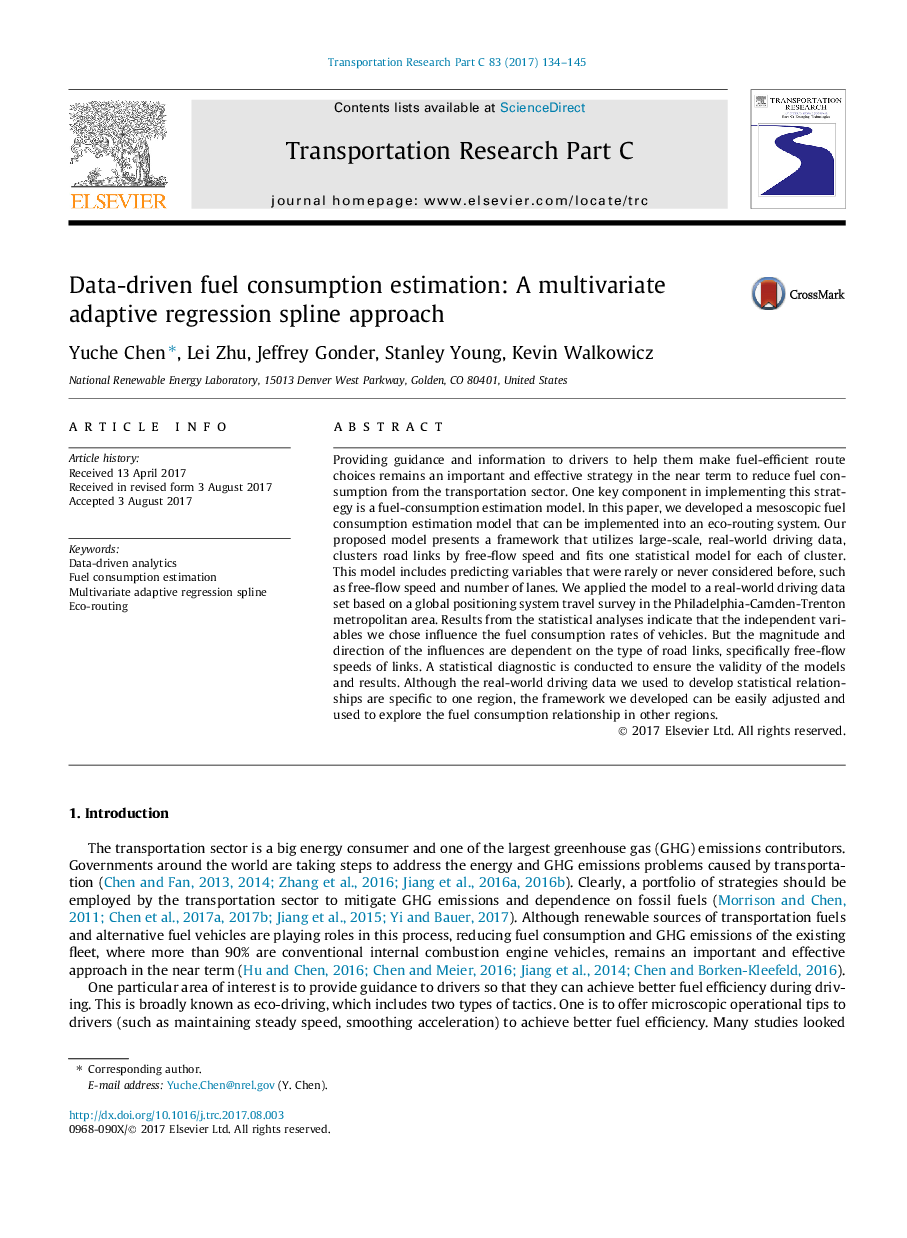| کد مقاله | کد نشریه | سال انتشار | مقاله انگلیسی | نسخه تمام متن |
|---|---|---|---|---|
| 4968474 | 1449665 | 2017 | 12 صفحه PDF | دانلود رایگان |
عنوان انگلیسی مقاله ISI
Data-driven fuel consumption estimation: A multivariate adaptive regression spline approach
ترجمه فارسی عنوان
برآورد مصرف سوخت بر اساس داده ها: رویکرد اسپلین رگرسیون چند متغیره
دانلود مقاله + سفارش ترجمه
دانلود مقاله ISI انگلیسی
رایگان برای ایرانیان
کلمات کلیدی
تجزیه و تحلیل داده محور برآورد مصرف سوخت، اسپلن رگرسیون چند متغیره انطباقی، زیست محیطی،
ترجمه چکیده
ارائه راهنمایی و اطلاعات به رانندگان برای کمک به آنها در انتخاب گزینه های کارآمد با استفاده از راهکار مهمی و موثر در کوتاه مدت برای کاهش مصرف سوخت از بخش حمل و نقل است. یکی از مولفه های اصلی در اجرای این استراتژی یک مدل تخمین مصرف سوخت است. در این مقاله، ما یک مدل تخمین مصرف سوخت مزوسکوپی را که می تواند در یک سیستم مسیریابی زیست محیطی اجرا شود، ایجاد کرد. مدل پیشنهادی ما چارچوبی را ارائه می دهد که اطلاعات رانندگی در دنیای واقعی را در بر می گیرد، خوشه های جاده ای را با سرعت جریان آزاد و متناسب با یک مدل آماری برای هر خوشه ای. این مدل شامل پیش بینی متغیرهایی است که به ندرت یا هرگز در نظر گرفته نشده اند مانند سرعت جریان آزاد و تعداد خطوط. ما مدل را به یک داده رانندگی در دنیای واقعی بر اساس نظرسنجی سفر جهانی سیستم موقعیت یابی در منطقه شهری فیلادلفیا-کامدن-ترنتون اعمال کردیم. نتایج تجزیه و تحلیل آماری نشان می دهد که متغیرهای مستقل ما بر میزان مصرف سوخت وسایل نقلیه تأثیر می گذاریم. اما اندازه و جهت تأثیرات وابسته به نوع ارتباطات جاده ای، به ویژه سرعت جریان آزاد لینک است. برای اطمینان از اعتبار مدل ها و نتایج، یک تشخیص آماری انجام می شود. اگرچه داده های رانندگی در دنیای واقعی ما برای توسعه روابط آماری خاص در یک منطقه استفاده می شود، چارچوبی که توسعه دادیم می توان به راحتی تنظیم کرد و برای کشف ارتباط مصرف سوخت در سایر مناطق استفاده کرد.
موضوعات مرتبط
مهندسی و علوم پایه
مهندسی کامپیوتر
نرم افزارهای علوم کامپیوتر
چکیده انگلیسی
Providing guidance and information to drivers to help them make fuel-efficient route choices remains an important and effective strategy in the near term to reduce fuel consumption from the transportation sector. One key component in implementing this strategy is a fuel-consumption estimation model. In this paper, we developed a mesoscopic fuel consumption estimation model that can be implemented into an eco-routing system. Our proposed model presents a framework that utilizes large-scale, real-world driving data, clusters road links by free-flow speed and fits one statistical model for each of cluster. This model includes predicting variables that were rarely or never considered before, such as free-flow speed and number of lanes. We applied the model to a real-world driving data set based on a global positioning system travel survey in the Philadelphia-Camden-Trenton metropolitan area. Results from the statistical analyses indicate that the independent variables we chose influence the fuel consumption rates of vehicles. But the magnitude and direction of the influences are dependent on the type of road links, specifically free-flow speeds of links. A statistical diagnostic is conducted to ensure the validity of the models and results. Although the real-world driving data we used to develop statistical relationships are specific to one region, the framework we developed can be easily adjusted and used to explore the fuel consumption relationship in other regions.
ناشر
Database: Elsevier - ScienceDirect (ساینس دایرکت)
Journal: Transportation Research Part C: Emerging Technologies - Volume 83, October 2017, Pages 134-145
Journal: Transportation Research Part C: Emerging Technologies - Volume 83, October 2017, Pages 134-145
نویسندگان
Yuche Chen, Lei Zhu, Jeffrey Gonder, Stanley Young, Kevin Walkowicz,
